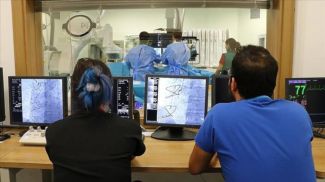URUMQI, 10 November (BelTA - China Daily). - Until recently, it was not uncommon for people who live on the pastures of Northwest China's Xinjiang Uygur autonomous region to exert significant time and effort chasing after lost livestock that would wander off during grazing.
The vastness of the landscape can make the search for a stray animal akin to looking for a needle in a haystack.
To solve the problem, a technology company in Urumqi has developed a system which can locate the livestock with pinpoint accuracy, and in real time, through satellite positioning.
Chen Hu, deputy general manager of the company, promoted the system to herders, and they welcomed the new technology. "In the past, cattle and sheep ran all over the mountain, and people were all busy searching for lost livestock. Now they can stay at home while letting their animals graze, without worrying about where to find them, leaving more time to complete other work," says Chen.
According to Tang Sishi, general producer of the show, in recent years, people seem anxious about their jobs, and have created popular terms to depict that, like "996 working schedule", which refers to working from 9 am to 9 pm, six days a week, and neijuan, or involution, a situation in which participants are trapped in fierce and endless competition. However, she says many people around her, including herself, actually enjoy their work.
"I want to tell the stories of those who take pleasure in their jobs so as to inspire others. I hope people can find hope despite the overwhelming anxiety and negative attitudes toward certain jobs on the internet," says Tang.
As a result, crew members issued 1.8 million online questionnaires to gauge people's job satisfaction, and retrieved about 2,000 effective answers. They communicated with those people over the phone for a month, and tried to choose some who gave the impression that they "really enjoy working". On that basis, they finally chose six people from different industries and places, whose stories are featured in the series.
The second episode features Tang Hengxin, a 57-year-old engineer who works at a drone company founded by 22-year-old Li Kunhuang. They try to develop a drone system which can help extinguish forest fires, reducing the need to put actual firefighters in harm's way.
"Conflicts happen due to generation gaps. They have different ways of communicating with people. For example, Li, a young man, tends to be straightforward at pointing out others' mistakes, while Tang Hengxin prefers to be less direct. But, with a common goal, they can come together to try and create something," says Hu Yixin, director of the second episode.
In the old days, it was not common for an older person to have a young boss, but now with the burgeoning tech sector, it has become the norm.
"In the past, most people gained promotion through experience and seniority, so it would take people a long time to become a leader of a group. Nowadays, thanks to the internet, people can easily gain expertise and experience, giving younger people, if they are capable, easier channels to become leaders," says Hu.
According to Tang Sishi, those who can take pleasure from their work have something in common. "The most important thing for happy working is to believe the job has some value. When someone works hard, and can really bring value to others, the positive feedback supports them to overcome challenges and persist with what they are doing.
"Additionally, different from many people who lean toward prevailing job trends without careful consideration when looking for a job, these people actively choose their vocation, which means they are clear about what they entail.
"It's a positive circle. They have some foresight of the difficulties they will meet, but still choose to undertake the job, so they are more motivated to solve the problems when they arise," says Tang Sishi.
He says the conquering of one difficulty encourages these people to make further progress. "As a result, they often feel better compared with those who have no clear view of what job they want to do."











